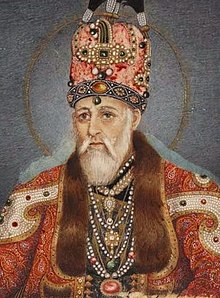
Back أكبر شاه الثاني Arabic اكبر شاه التانى ARZ II Əkbər Şah Azerbaijani अकबर II Bihari আকবর শাহ দ্বিতীয় Bengali/Bangla ئەکبەر شای دووەم CKB Akbar Šáh II. Czech Akbar Shah II. German Akbar II Spanish اکبر دوم Persian
This article needs additional citations for verification. (May 2017) |
| Akbar II | |||||||||||||
|---|---|---|---|---|---|---|---|---|---|---|---|---|---|
| King of Delhi Badshah Shahanshah-e-Hind | |||||||||||||
 Portrait of Akbar Shah II, c. 1827 | |||||||||||||
| 19th Mughal Emperor | |||||||||||||
| Reign | 19 November 1806 – 28 September 1837 | ||||||||||||
| Coronation | 19 November 1806 | ||||||||||||
| Predecessor | Shah Alam II | ||||||||||||
| Successor | Bahadur Shah II | ||||||||||||
| Born | Mirza Akbar 22 April 1760 Mukundpur, Rewa State, Maratha Confederacy | ||||||||||||
| Died | 28 September 1837 (aged 77) Delhi, Mughal Empire | ||||||||||||
| Burial | Moti Masjid, Delhi, India | ||||||||||||
| Spouse | Mumtaz Mahal[1] Anwar Mahal[2] Lal Bai[3] | ||||||||||||
| Issue | 14 sons including
Mirza Firuz Bakht 8 daughters | ||||||||||||
| |||||||||||||
| House | House of Babur | ||||||||||||
| Dynasty | Timurid dynasty | ||||||||||||
| Father | Shah Alam II | ||||||||||||
| Mother | Qudsia Begum | ||||||||||||
| Religion | Sunni Islam (Hanafi) | ||||||||||||
| Mughal emperors | ||||||||||||||||||||||||||||||||||||||||||||||
|---|---|---|---|---|---|---|---|---|---|---|---|---|---|---|---|---|---|---|---|---|---|---|---|---|---|---|---|---|---|---|---|---|---|---|---|---|---|---|---|---|---|---|---|---|---|---|
|
||||||||||||||||||||||||||||||||||||||||||||||
Akbar II (Persian pronunciation: [ak.baɾ]; 22 April 1760 – 28 September 1837), also known as Akbar Shah II, was the nineteenth Mughal emperor from 1806 to 1837. He was the second son of Shah Alam II and the father of Bahadur Shah II, who would eventually succeed him and become the last Mughal emperor.
Akbar had little de facto power due to the increasing British influence in India through the East India Company. He sent Ram Mohan Roy as an ambassador to Britain and gave him the title of Raja. During his regime, in 1835, the East India Company discontinued calling itself subject of the Mughal Emperor and issuing coins in his name. The Persian lines in the company's coins to this effect were deleted.
Akbar II was credited with starting the Hindu–Muslim unity festival Phool Walon Ki Sair.[5][6] His grave lies next to the dargah of 13th-century Sufi saint Qutbuddin Bakhtiar Kaki at Mehrauli.
- ^ Jatindra Kumar Majumdar, ed. (1939). Raja Rammohun Roy and the Last Moghuls: A Selection from Official Records, 1803–1859. Art Press. pp. xxxiii. ISBN 9788170410645.
- ^ Indian History Congress (1958). Proceedings, Volume 20. Indian History Congress. p. 316.
- ^ Syed Mahdi Husain (2006). Bahadur Shah Zafar and the War of 1857 in Delhi. Aakar Books. p. 36. ISBN 9788187879916.
- ^ "GREAT ESCAPE OF MIRZA JAHAN KHUSRO SON OF AKBAR SANI – HAJI MUHAMMED ISHAQUE DESCENDANT OF GREAT MUGHALS". 15 April 2020.
- ^ Dec 8, TNN / (8 December 2012). "Akbar, Dara Shikoh had set examples of Hindu-Muslim unity | Varanasi News – Times of India". The Times of India.
{{cite news}}: CS1 maint: numeric names: authors list (link) - ^ "Akbar and his religious policy" (PDF).